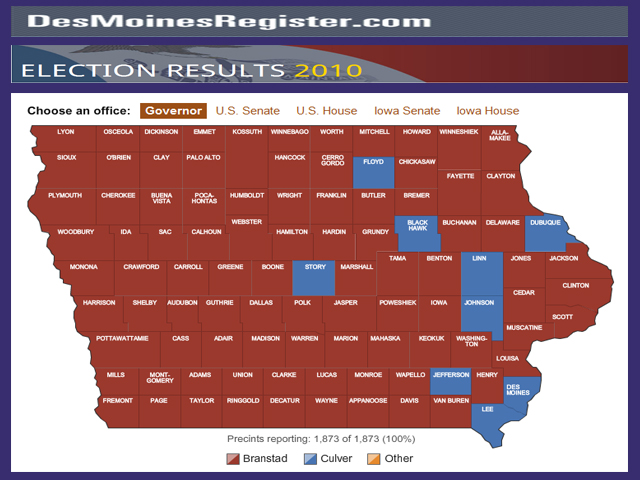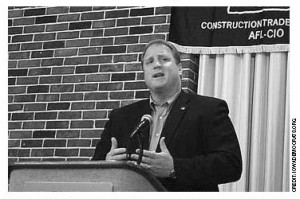Will Team Biden Weaponize Workers’ Pensions?
Big Labor abuse of worker pension and benefit funds as a means of advancing union bosses’ self-aggrandizing policy objectives is a familiar phenomenon.
Right to Work Makes Major Gains in State Legislative Contests
It takes a lot to convince Iowa citizens to oust a sitting governor. Until this fall, the last time a Hawkeye State chief executive failed to get another term after seeking one was in 1962! But over the past four years, Big Labor Democrat Gov. Chet Culver wore out Iowans’ considerable patience.
 On November 2, he was one of 13 incumbent governors on the ballot across America. Eleven of these incumbents won, but Mr. Culver lost by a hefty 53% to 43% margin.
On November 2, he was one of 13 incumbent governors on the ballot across America. Eleven of these incumbents won, but Mr. Culver lost by a hefty 53% to 43% margin.
What had Chet Culver done to receive such a harsh rebuke from normally amiable Midwesterners? He tried to gut Iowa’s popular Right to Work law — and he was sneaky about it.
After saying nothing about the Right to Work issue during his successful 2006 gubernatorial campaign, Mr. Culver announced, almost as soon as the votes were counted, his support for legislation imposing forced union dues and fees on Iowa workers as a condition of employment.
Since Mr. Culver’s fellow Democrats controlled substantial majorities in both chambers of the Iowa Legislature that greeted him upon his inauguration in early 2007, it seemed Big Labor’s stealthy scheme to bring back forced unionism to the state six decades after it had been banned would succeed.

But the National Right to Work Committee and the Iowans for Right to Work Committee were already mobilizing resistance.
Pro-Right to Work Iowan Stopped Forced-Union-Fee Schemes in 2007 and 2009
Even before the new Legislature convened in January 2007, the National Committee began sending out a series of statewide and targeted mailings to members and supporters in Iowa, with a focus on selected House and Senate members in vulnerable seats.
In the end, although a forced-union-fee bill (S.F.413) was rubber-stamped by the Senate, union-label Speaker Pat Murphy (D-Dubuque) and his cohorts were never able to round up the votes to get it through the House. Consequently, they never put it up for a House floor vote.
In 2009, Big Labor-backed Rep. Bruce Hunter (D-Des Moines) introduced another forced-union-fee bill, H.R.555. It too failed to secure a House floor vote due, once again, to well-mobilized Right to Work opposition.
But it wasn’t until November 2, 2010, that Right to Work supporters got a chance to show how they really felt about a governor who wanted to empower Big Labor to compel workers to pay fees to a union they would never voluntarily join.
“While there were other issues in the gubernatorial race, Chet Culver’s pandering to the union bosses and their forced-unionism agenda sufficed in itself to kill his re-election hopes,” commented Greg Mourad, director of legislative affairs for the National Committee.
“Pro-Right to Work Iowans also sent a strong message in state legislative races. Union-label Speaker Murphy’s Democratic House caucus shrank from a 56-44 majority to a 40-60 minority. Union boss-backed incumbents as well as ‘open-seat’ candidates were swept up in the wave.
“In the state Senate, only half of the 50 seats were up for grabs. That allowed Big Labor Majority Leader Mike Gronstal [Council Bluffs] to hold on to his post, but just barely, as his Democrat caucus shrank from 32 to 26.”
While, thanks to National Committee members and grass-roots activists, Iowa’s Right to Work law has remained intact during the Culver years, incoming pro-Right to Work Gov. Terry Branstad (R) and House Speaker Kraig Paulsen (R-Hiawatha) will have a lot of union boss-inspired damage to undo once they take office.
Incoming Governor, House Speaker Will Have to Undo a Lot of Damage
One outrageous and very recent example is outgoing Gov. Culver’s mid-November move to add $200 million to already-beleaguered Iowa taxpayers’ burden over the next two years as a parting contract gift to state employee union bosses.
“Even though they didn’t get the Right to Work destruction law they craved, government union bosses made out big during the Culver Administration,” said Mr. Mourad.
“To get Iowa’s fiscal house back in order, Gov. Branstad and Speaker Paulsen should aim not just to preserve Iowa’s Right to Work law, but also to roll back policies authorizing union monopoly bargaining in the government sector.”

Big Labor abuse of worker pension and benefit funds as a means of advancing union bosses’ self-aggrandizing policy objectives is a familiar phenomenon.

Leaked CTU Proposals Won’t Do Anything to Improve Schools’ Poor Performance

What impact does handing a union monopoly power to deal with your employer on matters concerning your pay, benefits, and work rules have on your pay?